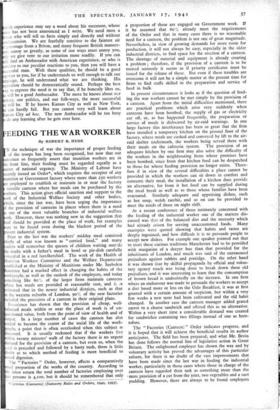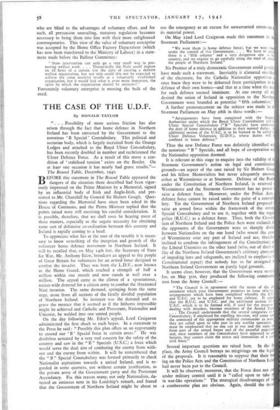EEDING THE WAR WORKER
By ROBERT It HYDE
N the technique of war the importance of proper feeding of the troops has long been recognised, but now that our ratesmen so frequently assert that munition workers are in e front line, their feeding must be regarded equally as a atter of national urgency. The Ministry of Labour have ecently issued an Order*, which requires the occupier of any unition or Government factory where more than 25o workers re employed to establish or maintain in or near the factory suitable canteen where hot meals can be purchased by the orkers. This action gives official sanction and support to the ork of the Industrial Welfare Society and other bodies, hich, since the last war, have been urging the importance f the provision of canteens in places where there is a need s one of the most valuable branches of industrial welfare ork. However, there was nothing new in the suggestion that ood should be provided at the place of work, for examples ere to be found even during the blackest period of the resent industrial system.
Prior to the last war the workers' midday meal consisted hiefly of what was known as " carried food," and many 'aders will remember the queues of children waiting outs:de e works with a father's meal in bowl or pie-dish carefully oncealed in a red handkerchief. The work of the Health of unition Workers Committee and the Welfare Department stablished at the Ministry of Munitions under Mr. Seebohm owntree had a marked effect in changing the habits of the orkpeople, as well as the outlook of the employers, and today omething like 6o% of the larger firms maintain canteens here hot meals are provided at reasonable cost, and h is stimated that in the newer industrial districts, such as that the western suburbs of London, 00% of the new factories cluded the provision of a canteen in their original plans.
Experience has shown that the provision of cheap, well- alanced meals within or near the place of work is of un- uestioned value, both from the point of view of health and of utput. In a large number of cases the canteen has also ended to become the centre of the social life of the work- ople, a point that is often overlooked when this subject is scussed. It is usually reckoned that if the workers live ithin twenty minutes' walk of the factory there is no urgent emand for the provision of a canteen, but even so, when the ::al is preceded and followed by a hasty rush, there is little oubt as to which method of feeding is more beneficial to ound digestion.
The " Factories " Order, however, affects a comparatively mall proportion of the works of the country. According to e latest return the total number of factories employing over 5o persons is 4,Ioo, but it should be remembered that only
*Factories (Canteens) (Statutory Rules and Orders, 194o, 1993).
a proportion of these are engaged on Government work. If it be assumed that 6o% already meet the requirements of the Order and that in many cases there is no reasonable need for a canteen, the problem is not one of great magnitude. Nevertheless, in view of growing demands for more room for production, it will not always be easy, especially in the older industrial districts, to find space for the erection of a canteen. The shortage of material and equipment is already creating a problem ; therefore, if the provision of a canteen is to be treated seriously it seems as if priority certificates must be issued for the release of these. But even if these troubles are overcome it will not be a simple matter at the present time for firms to find staffs skilled in the preparation and service of food in bulk.
In present circumstances it looks as if the question of feed- ing the war workers cannot be met simply by the provision of a canteen. Apart from the initial difficulties mentioned, there are practical problems which arise very suddenly when canteens have been bombed, the supply of gas or electricity cut off, or, as has happened frequently, the preparation or service of meals is dislocated by air-raid warnings. In one large factory this interference has been so great that the firm have installed a temporary kitchen on the ground floor of the factory, where meals are cooked and conveyed by lift to the air- raid shelter underneath, the workers being served there with their meals on the cafeteria system. The provision of an adequate kitchen by one firm may also solve the difficulty of the workers in the neighbouring firms whose premises have been bombed, since from that kitchen food can be despatched to those for whose feeding provision no longer exists. There- fore if in view of the several difficulties a place cannot be provided in which the workers can sit down in comfort and consume their meal, the installation of a kitchen does provide an alternative, for from it hot food can be supplied during the meal break as well as to those whose families have been evacuated. Similarly adequate and appetising dishes, such as hot soup, welsh rarebit, and so on can be provided to meet the needs of those on night shift.
At a recent conference of those intimately concerned with the feeding of the industrial worker one of the matters dis- cussed was that of the balanced diet and the necessity which had already arisen for serving unaccustomed foods. Many examples were quoted showing that habits and tastes are deeply ingrained, and how difficult it is to persuade people to accept new dishes. For example one speaker pointed out that to meet these curious traditions Manchester had to be provided with margarine of a deeper hue than that provided for the inhabitants of London, and much was said of the unreasoned prejudices against rabbits and porridge. On the other hand it was shown that by skilful propaganda by official and volun- tary agency much was being done to break, down these old prejudices, and it was interesting to learn that the consumption of brown bread is undoubtedly on the increase. In one firm where an endeavour was made to persuade the workers to accept a diet based more or less on the Oslo Breakfast, it was at first greeted with a certain amount of suspicion, but within a very few weeks a new taste had been cultivated and the old habit changed. In another case the canteen manager added grated carrot to a cheese sandwich and offered this as an alternative.
Within a very short time a considerable demand was created for sandwiches containing two fillings instead of one as here- tofore.
The " Factories (Canteen) " Order indicates progress, and it is hoped that it will achieve the beneficial results its author anticipates. The field has been prepared, and what Mr. Bevin has done follows the normal line of legislative action in Great Britain. The enlightened employer has shown the way and by voluntary activity has proved the advantages of this particular reform, for there is no doubt of the vast improvements that have been made since the last war in feeding the industrial worker, particularly in those cases where those in charge of the canteen have regarded their task as something more than the .mere provision of a cut from the joint, two vegetables and a suet pudding. However, there are always to be found employers who are blind to the advantages of voluntary effort, and for such, all persuasion unavailing, statutory regulation becomes necessary to bring them into line with their more enlightened contemporaries. This view of the value of voluntary enterprise was accepted by the Home Office Factory Department (which has now been transferred to the Ministry of Labour) in a state- ment made before the Balfour Committee:
" State intervention can only go a very small way in pro- moting welfare work. . . . Theoretically the State could impose on all firms of a certain size the duty of creating a definite welfare organisation, but not only could this not be expected to achieve the same material results as a voluntarily established organisation, but it would lack what is even more important, the spirit by which the organisation should be animated."
Fortunately voluntary enterprise is meeting the bulk of the need.































 Previous page
Previous page